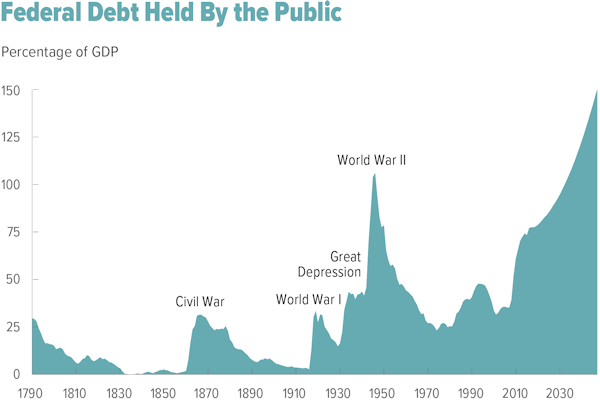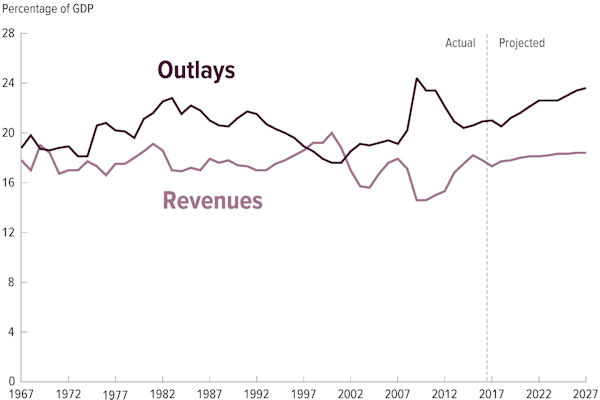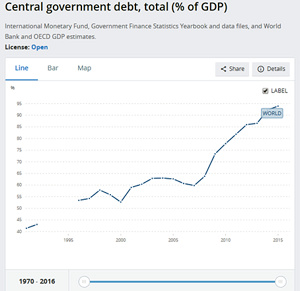America, On Debt
America, and the globe, are strung out on debt. US Sen. Bob Corker (R-Tenn.), chairman of the Senate Foreign Relations Comm., said in March 2016: “The issue of our national debt has been an issue that our top military officials, presidents on both sides of the aisle, secretaries of state on both sides of the aisle, have considered to be a major threat to our nation, and it certainly limits our ability to respond to crises.”2 Unlike other threats to our social fabric—moral, political or racial—debt can be accurately tracked and its impact mathematically projected from the individual to the national to the global level.

From ancient wisdom: “…a foolish man devours all he has.” (Pro 21:20, NIV unless noted). It’s foolish to break even, let alone incur debt, because of “emergencies.” “The rich rules over the poor, and the borrower is the slave of the lender.” (Pro 22:7, ESV). Borrowing brings subservience. One of the curses promised for Israel’s disobedience to God was that the sojourner would “lend to you, and you shall not lend to him. He shall be the head, and you shall be the tail.” (Deut. 28:44). However, as a reward for obedience, God promised “you shall lend to many nations, but you shall not borrow.” (Deut. 15:6). Christians are commanded to lend (Luk 6:34-35, compare Psa 37:26), so borrowing isn’t a sin, but they are also not to owe [be in arrears] anything (Rom 13:8).
Where is heaven? If there is none, what is more sensible than creating a heaven on earth? Since living without debt usually necessitates a substantial delay of gratification, to immediately enjoy our brief life, debt-funded gratification is rational. Life is filled with the best entertainments, dining, housing, cars, clothing, and vacations that our credit limits allow. However, our leased ride to the grave may be repossessed before arrival: “Whoever loves pleasure will be a poor man” (Pro 21:17a).
Granted, student debt has potentially a good return if in a marketable field, compared with borrowing for a new car, which may depreciate 11% within the first mile.3 A home may or may not appreciate in value, as the 2008 financial crisis illustrates. Total US household debt in April 2017 was a record $12.7 trillion dollars.4 The student loan 90-day delinquency rate is approximately 11%, while auto loan delinquency has risen to almost 4%.5 In fact, US student debt, auto loans, and credit card debt each stand at more than 1 trillion dollars.6 Thirty-eight percent of US households carry credit card debt, averaging $16,048.7
Municipal bankruptcies include Detroit, which owed $18-20 billion dollars. Illinois is over $14 billion in debt and Puerto Rico defaulted on $779 billion in loans in 2016.8 State and local governments have unfunded pension liabilities of over $5 trillion.9 Social Security was $32 trillion in the red as of 2016, increasing $6 trillion from 2015-16 alone, and is 32% underfunded.10 The US national debt will likely have reached $20 trillion dollars by the time you read this.

Does US deficit spending matter? There appears to be much obfuscation and denial that it does, through discussion of percentages of Gross Domestic Product to the national debt, and perhaps because currently the US can print money that is accepted globally. However it unquestionably matters due to the interest we pay on that debt. In 2016 that come to $432.6 billion.11 This is projected to be our biggest budget item by 2049—an unimaginable burden to our children and grandchildren.12 The higher the interest, together with mandatory (entitlement) programs, the less is available for “discretionary” expenses, such as national defense, infrastructure and national emergencies. Currently 31% of federal spending is discretionary—by 2047 it is projected to drop to 18%.13 A nearly silent crisis unfolds. Our national debt was almost a non-issue in the 2016 presidential election, and remains so. Few politicians can long survive fiscal restraint before a plethora of needs, real or unreal, each with issue-identity advocates. Most of our leaders are making economics a far more dismal science.
The debt will further tear apart our social fabric. Battle lines are drawn on Medicaid, defense, infrastructure, foreign aid, The Wall, etc. Even among Christians, ethical issues of care for the poor, environmental issues, immigration, education, etc. will meet realities of how much money is there to allocate, or how much the debt ceiling will be raised to cover anyway. Already people who care about fiscal responsibility are portrayed as inhumanly callous in the Medicare debates. Pressures will increase against those trying to roll back “entitlements.” Groups arise which turn privileges into new rights—the “right” to good housing, medical care and higher education. One person’s right is seen as another’s obligation to deliver on that “right.” The moral bases for such rights are debatable at best, even if one believes in moral absolutes--and only about 35% of American adults in 2016 believed in any moral absolutes.14
Who owns the US national debt? China owns over $1 trillion of it, just behind Japan’s $1.1 trillion, as of April, 2017.15 The borrower is servant to the lender. It’s uncertain what will happen at “The Great Unwinding,” or sale of debt instruments purchased through “quantitative easing” stimulus dollars--$4.5 trillion or so.16 The common concern in such a scenario is increased inflation, and if interest rates rise much from currently historically low rates, interest rates on the national debt will likely rise as well. Even if the unwinding does not increase rates, the Fed will increase them. The Congressional Budget Office estimates that these planned increases will cost the US government an extra $2.9 trillion within 10 years.17 Longer range, if the US dollar is no longer considered secure, the global reserve currency will move away from the dollar, so that it will not be as accepted globally as it now is. Misery has its company. The World Bank graph of global central government debt from 1970-2016 shows debt growth as a percent of Gross Domestic Product going from 42% to 94%.18 Globally, governments are on debt.
 A prudent person will not be under bondage to a lender any longer than is absolutely necessary. If the world wantonly overspends, the wise person sees danger and hides. We do not have to have all this world has to offer, when the next world offers Christians more--God Himself, as well as pleasures at His right hand (Psa 16:11). If we’re without debt, we don’t have to fear mortgage holders at the next crisis. With no balance, we don’t worry about credit card interest. We won’t be anxious about tomorrow, since we’ve saved for contingencies. As part of a local church, we’re able to assist others in worse financial situations, according to genuine need. A prudent person will not be under bondage to a lender any longer than is absolutely necessary. If the world wantonly overspends, the wise person sees danger and hides. We do not have to have all this world has to offer, when the next world offers Christians more--God Himself, as well as pleasures at His right hand (Psa 16:11). If we’re without debt, we don’t have to fear mortgage holders at the next crisis. With no balance, we don’t worry about credit card interest. We won’t be anxious about tomorrow, since we’ve saved for contingencies. As part of a local church, we’re able to assist others in worse financial situations, according to genuine need.
What steps can be taken?
- Be generous with those with legitimate needs.19
- Look for alternatives to student debt, such as earning before studying, using community colleges and alternative certificates.20
- Provide a suitable inheritance for children and grandchildren, and stress earning scholarships and delayed gratification.
- Get better informed through organizations such as www.fixthedebt.org.
- Be informed on candidate positions regarding national debt. Re-elect those courageous enough to support at least a balanced budget. Pray that leaders will understand the times.21
- God has promised to those seeking first His Kingdom provision of basic needs of food and clothing, so He tells us not to be anxious about the future (Luk 12:22-31; Mat 6:25-34; Heb 13:5-6; Hab 3:17-18).
1 https://www.cbo.gov/publication/52480
2 https://www.corker.senate.gov/public/index.cfm/news-list?ID=7BBA2ED3-6FF0-4716-948B-4BE802C35939
3 www.trustedchoice.com/insurance-articles/wheels-wings-motors/car-depreciation
4 www.wsj.com/articles/u-s-household-debts-hit-record-high-in-first-quarter-1495033206
5 Federal Reserve Bank of New York, reported by the Wall Street Journal
6 http://www.barrons.com/articles/bofa-beware-the-trillion-dollar-trifecta-of-debt-1494430315
7 https://www.valuepenguin.com/average-credit-card-debt
8 https://www.wsj.com/articles/puerto-rico-to-default-on-constitutionally-guaranteed-debt-1467378242
9 https://www.forbes.com/sites/andrewbiggs/2016/07/01/are-state-and-local-government-pensions-underfunded-by-5-trillion/#d21f848157f0
10 https://www.forbes.com/sites/kotlikoff/2016/07/17/social-security-just-ran-a-6-trillion-deficit-and-no-one-noticed/#12951c973c14
11 https://www.treasurydirect.gov/govt/reports/ir/ir_expense.htm
12 http://www.pgpf.org/chart-archive/0208_growing_interest
13 http://www.pgpf.org/chart-archive/0156_mandatory_discretionary_pies
14 https://www.barna.com/research/the-end-of-absolutes-americas-new-moral-code/
15 https://en.wikipedia.org/wiki/National_debt_of_the_United_States
16 https://www.thebalance.com/who-owns-the-u-s-national-debt-3306124
17 http://www.investopedia.com/articles/investing/010616/impact-fed-interest-rate-hike.asp?lgl=myfinance-layout-no-ads
18 https://data.worldbank.org/indicator/GC.DOD.TOTL.GD.ZS
19 “Blessed is the one who considers the poor! In the day of trouble the LORD delivers him.” (Psa 41:1 ESV)
20 https://www.good.is/articles/is-the-certificate-the-new-college-degree
21 Compare: “We all know what to do, but we don’t know how to get re-elected once we have done it.” (Jean-Claude Juncker, Luxembourg Prime Minister—dubbed “Juncker’s Curse”), Issues in Comparative Politics, “The Global Market: Development, Poverty, And Inequality”, p. 276 |